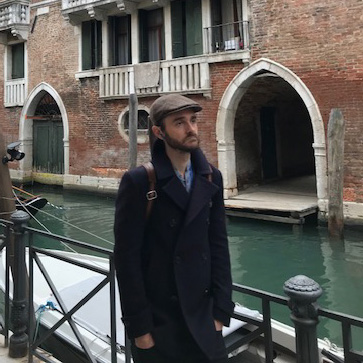Sean Nelson ’99 has made Italy his home on and off for more than 10 years. He is an art history professor at Syracuse University in Florence, and was the guide for Punahou Alumni Travel’s tour to Italy in 2017. He lives in Florence with his wife and toddler son. Although he wasn’t officially tested for COVID-19, he suspects he may have been infected with the virus and recovered.

“I initially got sick around the first week of March, at the very beginning of the official quarantine that shut down all of Italy. While I have mostly recovered, aspects of the illness remained for several weeks – a sore throat in the morning and some tightness in the chest that developed later. The onset of the illness was very quick. It came on much like a flu, with an elevated temperature and chills. The first stage passed in about a day. This was followed by a dry cough. I recovered from the cough within a week and was back up and around with minimal time spent in bed. Later, a tightness in my chest followed, but also passed with a little rest. The official directive from the Italian Ministry of Health has been that only those who have trouble breathing or are in grave condition should be tested, given the lack of kits and medical personnel. Instead we have been instructed to consult our family doctor, who has been ordered to be on-call 24 hours a day seven days a week. After speaking with her, she concluded that it was best if I stay at home and maintain a self-quarantine. After the onset of my illness, my family did not leave our home for almost 18 days.
My son just had his fourth birthday, and our neighbors in our apartment complex sang to him from their terraces and hallways. A simple event like a toddler’s birthday party now has the potential to unify in a way that it never did before. Our neighbors even managed to get him gifts from a local grocery store, which was a real surprise given the circumstances. The other day, however, he begged to go outside, and it was challenging to explain to him how radically the world has changed in such a short amount of time. A month ago, we walked to the park regularly, saw his friends nearly every day, and now, he has not been outside in nearly three weeks.
Italy has been one of the most impacted countries to date because it did not move quickly enough to quarantine the entire nation… In some ways, they can be forgiven for this because there was no sizable outbreak in Europe before the cases in Northern Italy appeared. But the government moved swiftly to rectify these initial missteps. It is striving to be a model of recovery. The region of Tuscany has now put through a funding bill that will allow for every citizen to be tested for COVID-19. They are also researching the possibility of testing for antibodies to allow a select group of people to return to daily life. This is still to take place in the coming weeks, but in the meantime, the government has purchased masks for every household in the region and is in the process of shipping them out. Italy has outlawed all employers from firing employees; instead, organizing a work furlough program that incorporates vacation time and partial pay. They have had minimal turnover in employment as a result of the quarantine. Gig workers and seasonal laborers have been disproportionately affected, but they will likely provide a safety net for them in the coming days. Today, they just sent out word of an official suspension of rent on top of mortgages that have already been suspended. The Italian approach, while slow, has been effective and has been centered on saving lives and the economy at the same time.
My greatest fear is that the U.S. has not learned from the mistakes Italy made. I don’t see aggressive actions to curb the virus outside of devastated centers like New York. Quarantine cannot be a half-measure – this much is clear. Today in the L.A. Times, I saw a photo of people out at a farmer’s market, gathered in sizeable groups in ways that would anger anyone here. The general feeling among Italians is that Americans are not taking this seriously enough, and the evidence seems to illustrate that… In Italy, we are set to come out of quarantine in just a few weeks, and I have a feeling on the day that my son walks to the park again, my stateside colleagues will wish they were here. We will then be praying that the U.S. follows the same aggressive restrictions we put in place more than a month ago.”
